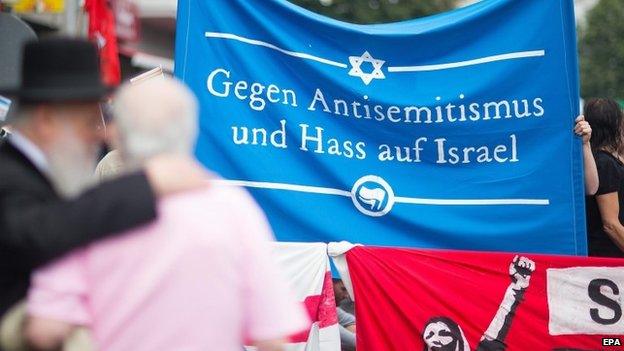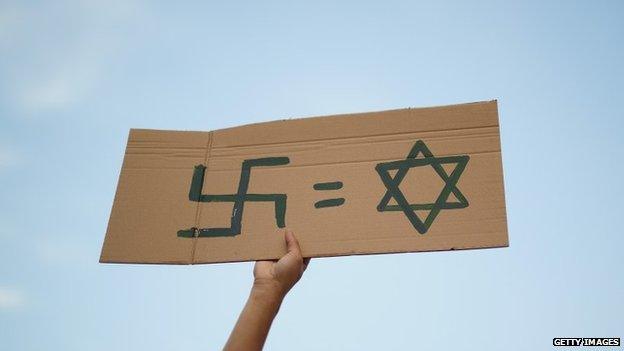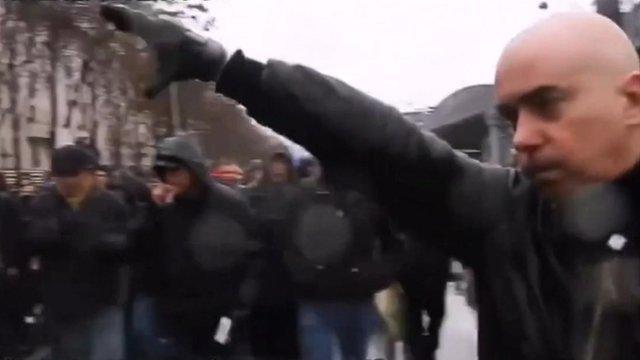Anti-Semitism comes back to haunt Europe
- Published

Pro-Israel activists in Berlin hold a banner saying "Against anti-Semitism and hatred of Israel"
It has been in the background at some of the demonstrations against Israeli actions in Gaza.
Recently, during a protest in Paris, a synagogue was attacked and it was reported there were chants of "Jews to the gas chambers". In Sarcelles, again there were reports of the slogan "death to the Jews" being used and a kosher market was set on fire. However, some of those taking part in the protest insist there was no anti-Semitic chanting.
Jewish groups have tracked an increase in the use of the words "dirty Jew" on Twitter.
In Berlin, too, similar language has been used at protest marches. An imam at a Berlin mosque apparently called for the murder of Zionist Jews. It led the Israeli Ambassador to Berlin, Yakov Hadas-Handelsman, to say "they pursue the Jews in the streets of Berlin as if it were in 1938".
The centre-left Social Democrats (SPD), in coalition with Chancellor Angel Merkel, described the incidents as "completely unbearable and unacceptable".
It has led the foreign ministers of France, Germany and Italy to issue a statement that "anti-Semitic rhetoric and hostility against Jews, attacks on people of Jewish belief and synagogues, have no place in our society."

A pro-Palestinian protester in Madrid equates Israel with the Nazis - a shocking comparison for Jews
In France they have already banned five protest marches over the events in Gaza. The Interior Minister, Bernard Cazeneuve, said "anti-Semitic violence exists; we must face it head on." The Prime Minister, Manuel Valls, said "to attack a Jew because he is a Jew is to attack France".
Right to protest
Even before the recent conflict in Gaza, anti-Semitic incidents were on the increase in France. Last year more than 3,000 Jews decided to move and make their future in Israel.
In May four people were shot dead at a Jewish museum in Brussels.
Governments face a dilemma: they want to defend the right to protest against Israel's attacks in heavily-populated Gaza and yet they are not prepared to have anti-Semitic slogans once again shouted on the streets of Europe.
In France one of the arguments used in banning the routine by the comedian Dieudonne - who the government said used gestures which were anti-Semitic, but which he denied - was that they did not want any form of anti-Semitism to become acceptable, even in comedy.
A former Israeli minister, Natan Sharansky, was quoted at the weekend as saying "we are seeing the beginning of the end of Jewish history in Europe".
Middle East hatred
Outside Europe, too, there are echoes of the past. In Mosul in Iraq, the extremist group the Islamic State (formerly Isis) has painted the letter N for Nassarah on the doors of Christians. They were told to "convert to Islam, pay a tax or be put to the sword". Most of them chose to flee. It led an Anglican leader in Baghdad to say that for the first time in more than 1,600 years the city of Mosul will have been emptied of Christians.
A colleague of mine said recently that in 25 years he could not recall the Middle East so riven by violence.
It is unleashing hatreds and presents Europe with a challenge: preserving freedoms to condemn, to denounce, to oppose - but not to indulge racism and the language of hate.
Update 6 February 2015: This page has been amended to clarify some of the events that took place in Paris on 20 July.
- Published24 July 2014

- Published25 July 2014

- Published14 April 2014
